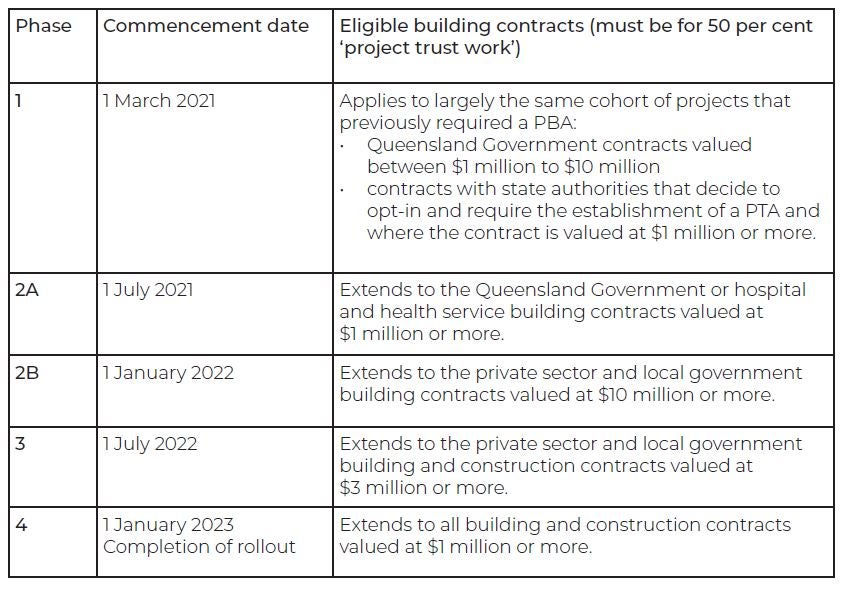29 June 2021
6 min read
#Construction, Infrastructure & Projects, #Government
Published by:

On 1 July 2021, the next phase of the implementation of the requirement for head contractors to establish Project Trust Accounts (PTAs) and Retention Trust Accounts (RTAs) on Queensland projects commences.
The commencement of the new phase will require head contractors to establish a PTA on a broader range of state government and hospital and health service projects than ever before by removing the previous $10 million valuation ceiling so that the scheme will now apply to larger projects.
Payments through a PTA fundamentally alters the traditional project payment model that historically involved head contractors paying subcontractors from their own bank account rather than a PTA. The rollout of the new system is set to continue over the next two years and PTAs will soon be required on most private and public sector commercial construction projects in Queensland valued at over $1 million.
Although other states throughout Australia have trialled, or considered implementing, some form of statutory trust system as a way of regulating payments to subcontractors on major projects, Queensland is the first state to commit to such wide-reaching legislative reform in this area. The timing and scale of the rollout means it is now urgent for the industry to understand exactly how and when PTAs will operate.
In this article, we cover:
On 15 July 2020, Queensland Parliament passed the Building Industry Fairness (Security of Payment) and Other Legislation Amendment Act 2020 (BIFOLA). The BIFOLA amends existing legislation and is the latest step in a well-publicised legislative reform program embarked upon by the current Queensland Government which will, once completed, radically change the way payments are made on most construction projects in this State.
The first step in the process was the introduction of the Building Industry Fairness (Security of Payment) Act 2017 (Qld) (BIF Act) in 2018. The BIF Act introduced the requirement for head contractors to establish PBAs but only on certain and, relatively limited, state government projects valued between $1 million and $10 million (including GST).
Subsequently, an evaluation panel was appointed by the Government to examine the impacts of the introduction of PBAs on the initial trial basis and, after a period of consultation with relevant stakeholders, that panel produced a report containing 20 recommendations on how the PBA framework could be changed and rolled out to ultimately cover a broader range of projects.
Each of these recommendations was adopted by the Government and have now been implemented (along with other changes to building legislation in the State) in the BIFOLA, which amends the BIF Act as well as other existing legislation.
On a superficial level, the BIFOLA changes the previous terminology by replacing the current requirement for a head contractor to establish a PBA with a requirement to establish a PTA on ‘eligible contracts.’ However, in substance, the new framework has a number of key differences to the old PBA system.
Under the previous PBA framework, a head contractor was required to open three separate bank accounts for each eligible project:
This process has now been simplified and streamlined. Under the new PTA framework, the ‘disputed funds trust account’ has been abolished. Instead, head contractors will only need to open:
This significantly reduces the account administration required of industry participants as compared to the PBA scheme. As noted above, the BIFOLA mandates that only a single account for cash retentions is required to be established for all projects where a PTA is required. This is a major change from the PBA requirement to establish different individual RTAs for each individual project.
Another significant change is that principals (who were almost exclusively the State Government under the PBA scheme) will no longer have the same level of oversight over the head contractor’s administration of a PTA. However, the Queensland Building and Construction Commission (QBCC), will take on an increased role in regulating compliance with the framework.
The QBCC’s powers now include:
The Queensland Government has planned for PTAs to be implemented over four phases to manage the transition to this new payment method. This has been done by each new phase expanding the applicability of the requirements to a broader range of projects.
The requirement to establish a PTA will only apply when the relevant head contract is for at least 50 per cent ‘project trust work’, which is defined broadly by the legislation to include most work undertaken in connection with a construction project. Importantly, ‘project trust work’ does not include work on transport infrastructure projects (e.g. roads, busways, tunnels, bridges and railways) and most mining work. Accordingly, there will not be a requirement to establish a PTA on those projects.
Phase 1 of the PTA rollout, which commenced on 1 March 2021, is currently in effect. The commencement dates for each of the phases are as follows:

Although the PTA rollout has now commenced, if a head contract is entered into because of a tender process that started before 1 March 2021, there is no requirement to comply with the BIFOLA PTA framework. However, the old PBA framework will apply to that head contract if it would have required a PBA under the BIF Act prior to the PTA amendments.
If the tender process for a contract started on or after 1 March 2021, and the commencement of the PTA scheme (or if there was no tender process for the contract at all), the relevant rollout phase applicable to the contract is determined by reference to the time the contract was entered into – i.e. the date of execution of the head contract.
So, for example, a head contractor will not be required to establish a PTA on an otherwise eligible state government project valued at $20 million if the head contract was entered into in June 2021.
If a contract does not require a PTA before the commencement of a new rollout phase, the project continues to not require a PTA despite the new phase coming into effect. However, this is subject to the exception that some amendments to the contract after execution (like variations or an increase in the contract price) may still trigger the need for a PTA to be established.
It is crucial that all stakeholders take the time to understand how the rollout will impact them and what will be required.
Disclaimer
The information in this publication is of a general nature and is not intended to address the circumstances of any particular individual or entity. Although we endeavour to provide accurate and timely information, we do not guarantee that the information in this article is accurate at the date it is received or that it will continue to be accurate in the future.
Published by: